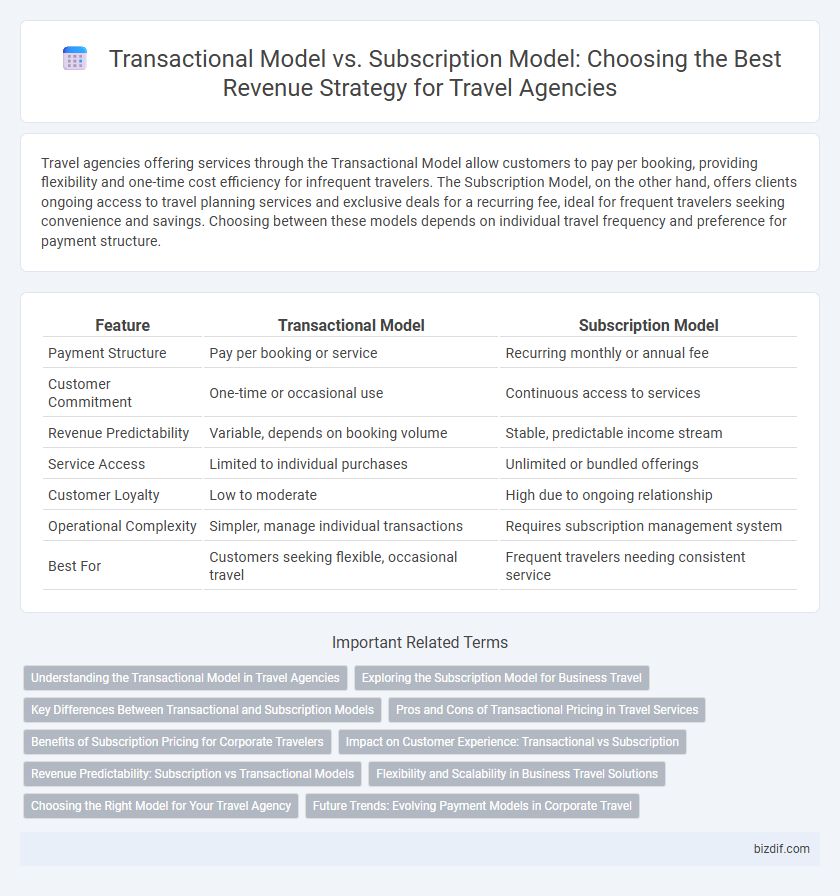Travel agencies offering services through the Transactional Model allow customers to pay per booking, providing flexibility and one-time cost efficiency for infrequent travelers. The Subscription Model, on the other hand, offers clients ongoing access to travel planning services and exclusive deals for a recurring fee, ideal for frequent travelers seeking convenience and savings. Choosing between these models depends on individual travel frequency and preference for payment structure.
Table of Comparison
| Feature | Transactional Model | Subscription Model |
|---|---|---|
| Payment Structure | Pay per booking or service | Recurring monthly or annual fee |
| Customer Commitment | One-time or occasional use | Continuous access to services |
| Revenue Predictability | Variable, depends on booking volume | Stable, predictable income stream |
| Service Access | Limited to individual purchases | Unlimited or bundled offerings |
| Customer Loyalty | Low to moderate | High due to ongoing relationship |
| Operational Complexity | Simpler, manage individual transactions | Requires subscription management system |
| Best For | Customers seeking flexible, occasional travel | Frequent travelers needing consistent service |
Understanding the Transactional Model in Travel Agencies
The transactional model in travel agencies involves customers paying for individual services such as flights, hotels, or tours without ongoing commitments, making it ideal for travelers seeking flexibility and one-off purchases. This model generates revenue through direct sales and often requires frequent marketing efforts to attract new customers for each transaction. Understanding its reliance on volume and diverse service offerings is crucial for travel agencies aiming to optimize profitability and customer acquisition.
Exploring the Subscription Model for Business Travel
The subscription model for business travel offers predictable monthly revenue and enhanced customer loyalty by providing tailored travel packages and exclusive benefits to corporate clients. Unlike the transactional model, which charges per booking and often leads to fluctuating income, subscription services streamline expense management and improve forecasting for both agencies and businesses. Leveraging data analytics, travel agencies can personalize offerings, optimize pricing, and foster long-term partnerships that increase retention and lifetime value.
Key Differences Between Transactional and Subscription Models
Transactional models in travel agencies charge customers per individual service or booking, such as flights or hotel stays, offering flexibility and one-time payment convenience. Subscription models provide continuous access to travel services or exclusive deals through recurring fees, promoting customer loyalty and predictable revenue streams. Key differences include payment frequency, customer commitment level, and revenue predictability, with transactional favoring occasional travelers and subscription targeting frequent travelers seeking value and convenience.
Pros and Cons of Transactional Pricing in Travel Services
Transactional pricing in travel services allows customers to pay only for specific trips or services, providing clear cost control and flexibility. This model can attract occasional travelers who prefer not to commit long-term, but may lead to inconsistent revenue for agencies and higher per-transaction fees. Limited customer loyalty and reduced predictability in sales are significant challenges when relying solely on transactional pricing in the competitive travel market.
Benefits of Subscription Pricing for Corporate Travelers
Subscription pricing for corporate travelers offers predictable travel expenses and simplified budget management, enhancing financial control for businesses. Frequent travelers benefit from customizable plans that include exclusive discounts, priority bookings, and flexible cancellations, improving overall travel convenience. This model fosters stronger client loyalty and streamlines the procurement process for corporate travel managers.
Impact on Customer Experience: Transactional vs Subscription
Transactional models in travel agencies offer customers flexibility and control over individual bookings, enhancing satisfaction through tailored, pay-per-use experiences. Subscription models provide continuous value with curated travel packages and exclusive perks, fostering loyalty and convenience by simplifying repeated travel planning. Customer experience improves with transactional models through choice and immediacy, while subscription models emphasize personalized service and consistent engagement.
Revenue Predictability: Subscription vs Transactional Models
Subscription models in travel agencies provide consistent, predictable revenue streams through recurring payments, enhancing cash flow stability. Transactional models generate income based on individual bookings or services, leading to variable and less predictable revenue patterns. Predictable revenues from subscriptions enable better financial planning and investment in customer experience improvements compared to the fluctuating nature of transactional earnings.
Flexibility and Scalability in Business Travel Solutions
The Transactional Model offers businesses flexibility by allowing payment only for individual travel bookings, making it ideal for companies with fluctuating travel needs. The Subscription Model provides scalability through predictable, recurring fees that support bulk travel arrangements and long-term planning. Travel agencies benefit from combining these models to optimize cost-efficiency and tailor services to diverse corporate travel demands.
Choosing the Right Model for Your Travel Agency
Selecting the right revenue model for your travel agency shapes customer engagement and profitability; transactional models offer pay-per-service flexibility, appealing to one-time travelers, while subscription models generate recurring income through exclusive perks and continuous support for loyal clients. Understanding client demographics and travel frequency helps optimize choice, ensuring services align with customer preferences and spending behaviors. Balancing immediate sales with long-term value delivery maximizes growth potential in a competitive travel market.
Future Trends: Evolving Payment Models in Corporate Travel
Corporate travel is shifting from traditional transactional models towards subscription-based payment systems, offering predictable costs and streamlined budgeting for enterprises. Subscription models enable travel agencies to provide personalized services, leveraging data analytics to enhance user experience and optimize travel spend management. Future trends indicate increased adoption of hybrid models combining transactional flexibility with subscription benefits, driven by demand for seamless digital payment integration and improved corporate traveler satisfaction.
Transactional Model vs Subscription Model Infographic

 bizdif.com
bizdif.com